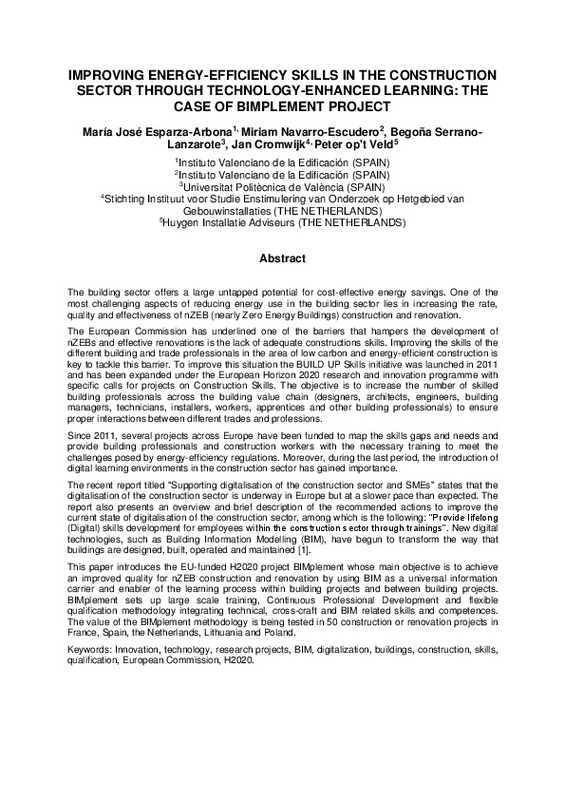|
Resumen:
|
[EN] The building sector offers a large untapped potential for cost-effective energy savings. One of the
most challenging aspects of reducing energy use in the building sector lies in increasing the rate,
quality and ...[+]
[EN] The building sector offers a large untapped potential for cost-effective energy savings. One of the
most challenging aspects of reducing energy use in the building sector lies in increasing the rate,
quality and effectiveness of nZEB (nearly Zero Energy Buildings) construction and renovation.
The European Commission has underlined one of the barriers that hampers the development of
nZEBs and effective renovations is the lack of adequate constructions skills. Improving the skills of the
different building and trade professionals in the area of low carbon and energy-efficient construction is
key to tackle this barrier. To improve this situation the BUILD UP Skills initiative was launched in 2011
and has been expanded under the European Horizon 2020 research and innovation programme with
specific calls for projects on Construction Skills. The objective is to increase the number of skilled
building professionals across the building value chain (designers, architects, engineers, building
managers, technicians, installers, workers, apprentices and other building professionals) to ensure
proper interactions between different trades and professions.
Since 2011, several projects across Europe have been funded to map the skills gaps and needs and
provide building professionals and construction workers with the necessary training to meet the
challenges posed by energy-efficiency regulations. Moreover, during the last period, the introduction of
digital learning environments in the construction sector has gained importance.
The recent report titled "Supporting digitalisation of the construction sector and SMEs" states that the
digitalisation of the construction sector is underway in Europe but at a slower pace than expected. The
report also presents an overview and brief description of the recommended actions to improve the
current state of digitalisation of the construction sector, among which is the following: ¿Provide lifelong
(Digital) skills development for employees within the construction sector through trainings¿. New digital
technologies, such as Building Information Modelling (BIM), have begun to transform the way that
buildings are designed, built, operated and maintained [1].
This paper introduces the EU-funded H2020 project BIMplement whose main objective is to achieve
an improved quality for nZEB construction and renovation by using BIM as a universal information
carrier and enabler of the learning process within building projects and between building projects.
BIMplement sets up large scale training, Continuous Professional Development and flexible
qualification methodology integrating technical, cross-craft and BIM related skills and competences.
The value of the BIMplement methodology is being tested in 50 construction or renovation projects in
France, Spain, the Netherlands, Lithuania and Poland.
[-]
|









